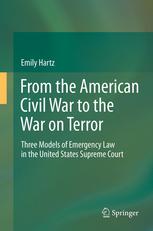

Most ebook files are in PDF format, so you can easily read them using various software such as Foxit Reader or directly on the Google Chrome browser.
Some ebook files are released by publishers in other formats such as .awz, .mobi, .epub, .fb2, etc. You may need to install specific software to read these formats on mobile/PC, such as Calibre.
Please read the tutorial at this link: https://ebookbell.com/faq
We offer FREE conversion to the popular formats you request; however, this may take some time. Therefore, right after payment, please email us, and we will try to provide the service as quickly as possible.
For some exceptional file formats or broken links (if any), please refrain from opening any disputes. Instead, email us first, and we will try to assist within a maximum of 6 hours.
EbookBell Team

5.0
100 reviewsThis book offers a systematic and comprehensive account of the key cases that have come to shape the jurisprudence on emergency law in the United States from the Civil War to the War on Terror. The legal questions raised in these cases concern fundamental constitutional issues such as the status of fundamental rights, the role of the court in times of war, and the question of how to interpret constitutional limitations to executive power. At stake in these difficult legal questions is the issue of how to conceive of the very status of law in liberal democratic states. The questions with which the Supreme Court justices have to grapple in these cases are therefore as philosophical as they are legal. In this book the Court's arguments are systematized according to categories informed by constitutional law as well as classic philosophical discussions of the problem of emergency. On this basis, the book singles out three legal paradigms for interpreting the problem of emergency: the rights model, the extra-legal model and the procedural model. This systematic approach helps the reader develop a philosophical and legal overview of central issues in the jurisprudence on emergency.